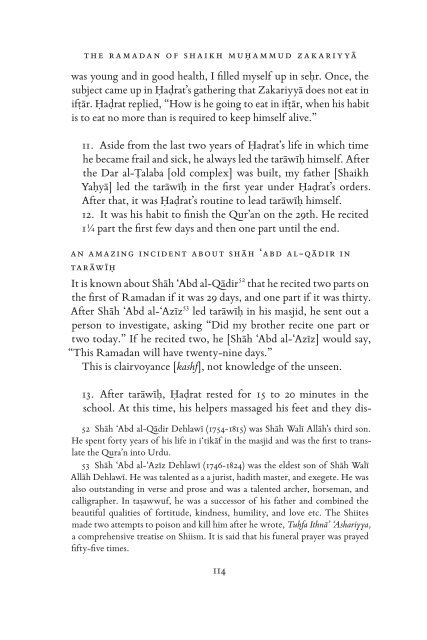TheRamadanOfShaykhAl-hadithMuhammadZakariyyaKandhelviAndOurEldersByShaykhDrMuhammadIsmailMemonMadani
TheRamadanOfShaykhAl-hadithMuhammadZakariyyaKandhelviAndOurEldersByShaykhDrMuhammadIsmailMemonMadani
TheRamadanOfShaykhAl-hadithMuhammadZakariyyaKandhelviAndOurEldersByShaykhDrMuhammadIsmailMemonMadani
You also want an ePaper? Increase the reach of your titles
YUMPU automatically turns print PDFs into web optimized ePapers that Google loves.
the ramadan of shaikh muĤ ammud zakariyyĀwas young and in good health, I filled myself up in seĥr. Once, thesubject came up in Ĥađrat’s gathering that Zakariyyā does not eat inifţār. Ĥađrat replied, “How is he going to eat in ifţār, when his habitis to eat no more than is required to keep himself alive.”11. Aside from the last two years of Ĥađrat’s life in which timehe became frail and sick, he always led the tarāwīĥ himself. Afterthe Dar al-Ţalaba [old complex] was built, my father [ShaikhYaĥyā] led the tarāwīĥ in the first year under Ĥađrat’s orders.After that, it was Ĥađrat’s routine to lead tarāwīĥ himself.12. It was his habit to finish the Qur’an on the 29th. He recited1¼ part the first few days and then one part until the end.An Amazing incident about Shāh ‘Abd al-Qādir inTarāwīĥIt is known about Shāh ‘Abd al-Qādir 52 that he recited two parts onthe first of Ramadan if it was 29 days, and one part if it was thirty.After Shāh ‘Abd al-‘Azīz 53 led tarāwīĥ in his masjid, he sent out aperson to investigate, asking “Did my brother recite one part ortwo today.” If he recited two, he [Shāh ‘Abd al-‘Azīz] would say,“This Ramadan will have twenty-nine days.”This is clairvoyance [kashf], not knowledge of the unseen.13. After tarāwīĥ, Ĥađrat rested for 15 to 20 minutes in theschool. At this time, his helpers massaged his feet and they dis-52 Shāh ‘Abd al-Qādir Dehlawī (1754-1815) was Shāh Walī Allāh’s third son.He spent forty years of his life in i‘tikāf in the masjid and was the first to translatethe Qura’n into Urdu.53 Shāh ‘Abd al-‘Azīz Dehlawī (1746-1824) was the eldest son of Shāh WalīAllāh Dehlawī. He was talented as a a jurist, hadith master, and exegete. He wasalso outstanding in verse and prose and was a talented archer, horseman, andcalligrapher. In taśawwuf, he was a successor of his father and combined thebeautiful qualities of fortitude, kindness, humility, and love etc. The Shiitesmade two attempts to poison and kill him after he wrote, Tuĥfa Ithnā’ ‘Ashariyya,a comprehensive treatise on Shiism. It is said that his funeral prayer was prayedfifty-five times.114


